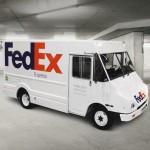Frito-Lay and parent company PepsiCo are showing their commitment to environmental sustainability, by announcing that their all-electric trucks have just passed one million miles of use.
Since going electric late last year, its fleet of 176 trucks by Smith Electric Vehicles has eliminated the need for approximately 200,000 gallons of diesel fuel. The all-electric trucks are used for deliveries on urban routes with fewer daily miles. Frito-Lay owns the seventh largest fleet in the U.S. with a total of over 20,000 trucks. The $13 billion convenient foods business has a goal to reduce greenhouse gases and fuel consumption 50 percent by 2020.
Frito-Lay owns the seventh largest fleet in the U.S. with a total of over 20,000 trucks. The $13 billion convenient foods business has a goal to reduce greenhouse gases and fuel consumption 50 percent by 2020.
“The first million miles with the electric trucks have been a journey of understanding and refining both how and where we use these vehicles, as well as providing input to help improve upon the performance for the next generation vehicle,” said Mike O’Connell, senior director of fleet capability for Frito-Lay North America.
This year Frito-Lay will purchase 100 Newton Series 2000 all-electric commercial vehicles bringing the total number of its electric fleet to more than 280, and a fuel consumption reduction of 500,000 gallons annually.
With all electric trucks fully deployed on routes, Frito-Lay expects to reduce their fuel consumption by 500,000 gallons a year. The trucks generate zero tailpipe emissions. Electric trucks reduce fuel consumption, noise pollution and vehicle CO2 emissions, compared to traditional delivery trucks.
Compressed natural gas (CNG) tractors will be introduced soon, and will be used to haul large loads. Each CNG vehicle, purchased from Freightliner, will reduce greenhouse gas emissions by 23 percent, compared to diesel. With 67 CNG vehicles planned to be on route by the end of the year, Frito-Lay will eliminate the need for more than 900,000 gallons of diesel fuel annually. The CNG vehicles will be used at seven Frito-Lay North America distribution centers, including: Rancho Cucamonga, CA; Irving, TX; Phoenix, AZ; Beloit, WI; Frankfort, IN; Charlotte, NC; and Casa Grande, AZ. The company piloted 18 CNG vehicles to prepare for the roll out.

